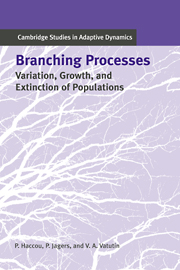Book contents
- Frontmatter
- Contents
- Authors
- Acknowledgments
- Notational Standards
- 1 Generalities
- 2 Discrete-Time Branching Processes
- 3 Branching in Continuous Time
- 4 Large Populations
- 5 Extinction
- 6 Development of Populations
- 7 Specific Models
- Appendix
- References
- Index
- The International Institute for Applied Systems Analysis
1 - Generalities
Published online by Cambridge University Press: 04 May 2010
- Frontmatter
- Contents
- Authors
- Acknowledgments
- Notational Standards
- 1 Generalities
- 2 Discrete-Time Branching Processes
- 3 Branching in Continuous Time
- 4 Large Populations
- 5 Extinction
- 6 Development of Populations
- 7 Specific Models
- Appendix
- References
- Index
- The International Institute for Applied Systems Analysis
Summary
Why should a biologist read a book about branching processes in biology, and why should a mathematician?
This book is aimed primarily at biologists, so let us start with the mathematicians. You should read this book because it places a beautiful mathematical theory in a proper context. This is not to say that branching processes cannot be viewed in contexts other than those of population biology. On the contrary, branching processes occur in particle physics, in chemistry, and in computer science. However, mathematics can lose its direction in the jungle of problems that are syntactically well formed and mathematically intriguing, but that have no clear bearing on the outside world. Too many mathematicians, in our view, work on intellectual riddles, while important scientific problems escape their attention. You should read this book to see that branching processes are not only a fascinating mathematical structure, but also can help us to understand fundamental questions of nature.
This applies whatever your field of mathematics happens to be. If your expertise is in parts of mathematics other than probability or statistics, such as traditional applied mathematics oriented on differential equations or physics, there is a further point: this book suggests an alternative, largely discrete approach to population dynamics. It also emphasizes the need to model the complete spectrum from the behavior of individuals up to population phenomena. This is characteristic of modern stochastics and brings modeling a step forward from classic (deterministic) applied mathematics, in which equations are typically derived by intuitive, non-rigorous arguments, and then analyzed in a strict mathematical manner.
- Type
- Chapter
- Information
- Branching ProcessesVariation, Growth, and Extinction of Populations, pp. 1 - 10Publisher: Cambridge University PressPrint publication year: 2005

